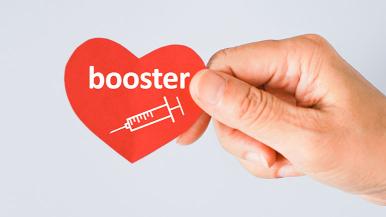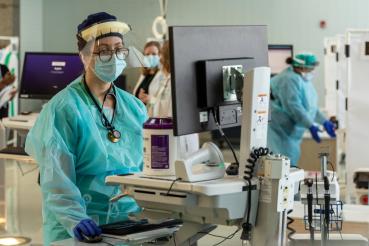Calling all adults: You’re now eligible for a COVID-19 booster if enough time has passed since you were first vaccinated.
We asked Michael Lin, MD, MPH, an infectious disease specialist and associate professor at Rush University Medical Center, to explain what’s been called a simpler approach to COVID-19 boosters.
Who is now eligible for Pfizer and Moderna boosters?
The U.S. Food and Drug Administration has authorized Pfizer and Moderna COVID-19 boosters for everyone 18 and older.
According to the Centers for Disease Control and Prevention, all adults can now receive a Pfizer or Moderna booster if it has been at least six months since they completed their primary two-dose series with the Pfizer or Moderna vaccines.
This replaces earlier CDC guidance that limited eligibility to older adults and those with underlying medical conditions or who lived or worked in high-risk settings.
Should I stick with the same type of vaccine (Pfizer or Moderna) that I had originally?
It’s up to you. CDC says you can “mix and match” by getting a different type of booster than your original shots, if you choose.
Can adults who had the Johnson & Johnson COVID-19 vaccine also get boosters?
If you received the single-dose Johnson & Johnson shot at least two months ago, the CDC states that you should get a booster with any of the COVID-19 vaccines available, including the Pfizer or Moderna boosters.
Why do we need boosters in the first place if the vaccines work?
COVID-19 vaccines remain highly effective in preventing infections, especially serious infections resulting in hospitalization and death, but we now know that they lose some effectiveness over time. So the boosters are an important strategy to boost our immune systems and prevent infections.
For the elderly and people with weakened immune systems who are vulnerable to severe outcomes of COVID-19 including hospitalization and death, having a booster can really make the difference between being healthy and being very sick.
For those with a normal immune system, even mild infections can be very symptomatic and disruptive, potentially causing long-term effects. And as the weather continues to get colder and we gather more indoors, there’s more opportunity for the virus to spread. So getting a booster can help us avoid getting sick and spreading COVID-19 to others, which we want to prevent as much as possible.
What are the side effects of COVID-19 boosters?
The side effects of boosters are the same as for the initial vaccine doses, according to the CDC. The most commonly reported side effects include fever, headache, fatigue and a sore arm.
Serious side effects like severe allergic reactions have been rarely reported.
Will we need to keep getting COVID-19 boosters?
We don’t know yet, but it’s something that the public health community is studying. For example, it’s possible that three doses of the Pfizer or Moderna vaccine may provide enough protection over the long term, but it’s also possible that we may need to get an annual vaccine, similar to what’s recommended for the flu.
Are we getting any closer to ending the pandemic?
On some level, we’re recognizing that we’ll have to live with COVID for the foreseeable future. But I do think there are certain restrictive aspects of the pandemic that will start to go away once the majority of people in the world are either vaccinated or have gotten immunity through infection, and as there are better treatments to take care of people who are sick from COVID.
I think it will be a gradual process, because it’s certainly a challenge right now to vaccinate worldwide. On a local level, there’s reason for optimism that probably the worst is behind us in terms of deaths and hospitalizations. But we still need to manage the risks of COVID, and boosters are an important strategy in the short term and potentially long term as well.
If you have not yet received a COVID-19 vaccine or would like to get a booster, you can schedule an appointment to receive one now at our vaccine clinics.




